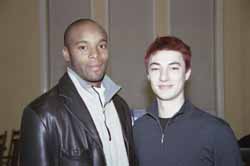The Philosophy and Education Program is a Burst of Energy and Excitement
David T. Hansen, Professor of Philosophy and Education and Coordinator of the program, and Christopher T. Higgins, Assistant Professor of Philosophy and Education, have generated a new curriculum that serves not only master's and doctoral students in philosophy and education, but also teachers and teacher candidates.
"We have deliberately conceived new courses with teachers and teacher candidates in mind," says Hansen, who was recently elected president of the national John Dewey Society. "We have planned the courses so that students can say: This is a place for me to go for my foundations work. This is a place for me to go to develop my philosophy of teaching, to develop my vision of who I am as a teacher and why I want to teach."
Higgins, who has been president of the Middle Atlantic States Philosophy and Education Society for a year now, illustrated the curriculum with the new course, "The Call to Teach." Higgins explains, "Both Professor Hansen and I have different emphasis in our research, but both of us work on issues in teacher identity, teacher growth, and the motivation teachers develop in their life through teaching. So we wanted to add a course that helps teachers and candidates think about their work in personal as well as professional terms. We wanted to create an approach in which students could think about this 2500-year-old practice of teaching and ask themselves what ideals and motives draw them to the work and help sustain them through both good times and bad."
The program has also developed intermediate level courses open to all TC doctoral students (and master's students if they receive permission). Hansen and Higgins describe three flagship courses that are designed to serve students across the College. An example is "The Philosophy of John Dewey," which honors the work of what many regard as America's greatest philosopher while also subjecting that work to searching intellectual scrutiny.
Another part of the new curricum is the attempt to build on the program's historic traditions. For instance, Maxine Greene, the William F. Russell Professor Emeritus, has for years been inspiring teachers to think about their practice in more expansive ways. She will be teaching "Education and the Aesthetic Experience" (formerly called "Aesthetics and Education"). The course is specifically designed to meet the needs of teachers and teacher candidates.
Hansen and Higgins are directing a Spencer Foundation Research Training Grant entitled "Ways of Knowing in Educational Research and Practice." The project attempts to bridge the gap between groups in the scholarly community who often keep each other at a distance: theoreticians and empirical researchers, qualitative and quantitative researchers, social scientists and humanists. They plan to create the curriculum for their new course,"Ways of Knowing."
The Philosophy and Education program now has over 30 doctoral students, including a record eight students who are currently teaching foundations courses as adjunct faculty in the tri-state region. "We are positioned to enhance philosophy and education at TC as a national leader in the field, as it has been since John Dewey up through Jonas Soltis, the William Heard Kilpatrick Professor Emeritus, and Greene," said Hansen. "We have the students who can do this. At the most recent conference of the Middle Atlantic States Philosophy of Education Society, which was held at Rutgers University, our students quite literally stole the show."
One of this new generation of doctoral students is Stephanie Mackler, who recently received a Spencer Foundation Dissertation Fellowship. Mackler is working on a conception of what the university could be in the 21st century.
Doctoral student Rodino Anderson was recently named a Diversity Fellow by TC. He is working with Hansen on a project entitled, "American Philosophies of Education." According to Hansen, Anderson "is searching web sources for philosophy departments, American Studies programs, and education departments that feature courses that relate in any way to American philosophies of education."
Two other doctoral students, Greg Bynum and Eli Moore, have recently been named Milbank Fellows, an award which provides a year-long scholarship. Bynum will be developing a philosophy of human rights and will build library resources to support teaching and research in human rights education. Moore will be studying TC's Milbank Library as an educational environment, and will produce a philosophy of the library as a learning place, as well as resources for enhancing libraries as learning communities.
In addition, doctoral student Seth Halvorsen has become the first doctoral student from TC to teach a core course for undergraduates at Columbia University.
The Program in Philosophy and Education aspires to help educators face successfully the challenges and difficulties in our contemporary educational world. As Hansen and Higgins say, "We think a major problem today is the pressure on teachers, principals, school counselors-and even crossing guards, bus drivers, and security guards-to do everything that society doesn't want to do for children. We find it sad that the country today seems so commercial and materialist, and that its current administration sets a tone of neglect for what education is truly all about."
Published Monday, Feb. 10, 2003
